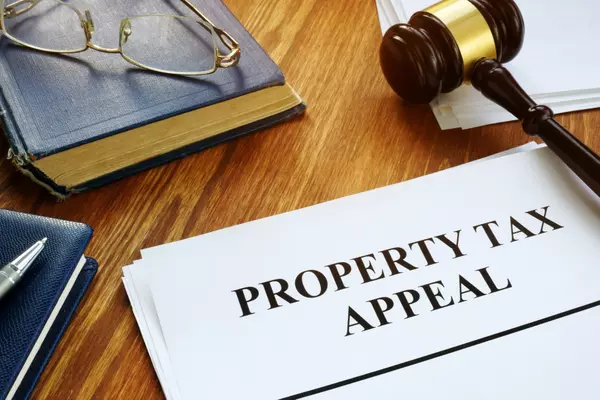Understanding Colorado's Proposition HH: Property Tax Changes, and Their Impact on Homeowners

I don’t think it’s any coincidence that Prop HH is one of the longest and most complicated taxing measures ever seen on a Colorado ballot. It amounts to 48 pages of legal verbiage affecting all kinds of taxes in Colorado. Like any measure, it’s going to appeal to someone, and there are “good” “bad” and “ugly” aspects, in my opinion. The Good What this does is it puts a temporary freeze on how they calculate property taxes in Colorado, capping it at 6.7% for a whole decade and also knocking $40,000 off the taxable value. I've broken down how Colorado calculates property taxes and given an example below to make it easier to grasp, but for most folks, it means you can expect a nice $300 to $500 drop in your property tax bill for the next decade. The Bad This marks a substantial, enduring increase in income taxes for everyone, not limited to just homeowners. In return for the temporary reduction in property taxes over a decade, the State will retain a portion of your tax refunds. What's noteworthy is that the portion the state retains follows a progressive pattern, with the amount increasing over time. By 2023, the State will hold an additional $94 million, and this figure keeps climbing, reaching $358 million in 2024 and 2025. As we look ahead to 2033 when the property tax decrease period ends, it's projected that the State will have accumulated an extra $2.2 billion from withheld income tax refunds. The rationale behind the State's retention of these tax refunds is ostensibly to "reimburse" institutions such as schools, fire departments, and libraries that will receive reduced funding due to the property tax reductions. However, this approach forces these entities to appeal to the State for what they would have naturally received without this legislation, effectively centralizing control of tax funds and enabling the State to selectively allocate resources. Additionally, the bill imposes rules and restrictions on taxing districts' ability to seek tax increases, ostensibly to maintain fiscal responsibility. While this may seem reasonable, it also transfers more control from local authorities to the State, potentially limiting local autonomy. The Ugly I usually steer clear of delving into demographic politics, but I can't help but voice my concern about the glaring inequity of this proposed tax hike. You see, our tax system has largely been structured to be progressive, meaning those who have more, contribute more. However, this proposal does the exact opposite. Here's the kicker: About 62% of Coloradans are homeowners, and they will experience a modest reduction in their property taxes. Now, the tax refund retention and income tax increase doesn't just affect homeowners; it applies to everyone. But here's where it gets tricky from an equity perspective: Roughly 71% of white individuals in Colorado own their homes, compared to 53% of Hispanics and only 37% of Black individuals. Statistically speaking, homeowners have a net worth that's about 40 times greater than that of non-homeowners. The average net worth of a homeowner stands at $225,000, while a renter's average net worth is a mere $6,300. So, under this proposed tax scheme, everyone faces the same tax increase burden, but only homeowners reap any benefits, and that too, only for a decade. This is what makes it one of the most lopsided tax proposals I've come across. Colorado's method for calculating property tax assessments is already quite intricate, so let me offer a concise explanation: The taxable value of your personal residence in Colorado is currently calculated at 6.765% of the assessed value. It's important to note that this 6.765% rate is temporary, as the statutory rate is set at 7.15%. However, for 2023, there was a temporary reduction to 6.765%, and it will gradually increase to 6.976% in 2024 before returning permanently to 7.15% in 2025. Property tax is assessed in what they refer to as "mils," with a mil being one one-thousandth of a dollar ($0.001). To illustrate, let's take an example: If your home is valued at $500,000 in unincorporated Adams County, where the tax rate is 87.925 mils, the taxable value of your home would be $33,825.00 (6.765% of $500,000). Consequently, your property taxes would amount to $3,018.88 ($33,825.00 x 0.087925). Now that we have this baseline understanding of how Colorado property taxes and tax rates currently work let’s move onto Prop HH. Proposition HH brings about a noteworthy change in property tax assessments. It sets the assessment rate at 6.7% until the year 2032, after which it will revert to 7.15% in 2033. In essence, this freeze on the temporary reduction extends for a decade, which is certainly a positive aspect. Additionally, it introduces a $40,000 reduction in property valuation for the next 10 years, meaning that, for tax purposes, your $500,000 house would be considered as worth $460,000. This is unquestionably a property tax decrease. Using the same example from earlier, property taxes under Proposition HH would amount to $2,709.84, resulting in a tax savings of $309.04. It's a good deal, and I'd be inclined to support it wholeheartedly. For a couple earning $100,000 and filing jointly in 2024, the estimated tax increase is around $200. However, if this couple owns the property described above, they would actually experience a net tax decrease in 2024, saving $109.00. In 2025, this same couple is projected to face a tax increase of $246. When it comes to homeowners, it's anticipated that the tax increase will eventually surpass the benefit of the property tax deduction by the year 2026. I don't know if it’s for you or not, but on November 7th, you’ll have your chance to see Prop HH defeated. Click below and learn more facts about Prop HH that you’re asked to vote on, on your November ballot! https://factsonprophh.com/ As always, we’re here for you to be your real estate resource for life. Please reach out if we can be of service to you or someone you know.
Read MoreProtesting Property Taxes in Colorado: 5 Top Tips for Lowering Your Tax Burden

Colorado Property Owners: Don't Overpay Your Taxes, Here's How to Protest If you're a Colorado property owner, you may have experienced the frustration of receiving a property tax bill that seems unfairly high. Early reports show some homeowners are facing as much as a 50+% hike in property taxes in one year! That's obviously a result of the rapid rise in property values experienced during the post-pandemic real estate boom of 2020-2022. Fortunately, there are steps you can take to protest your property taxes and potentially lower your bill. In this blog post, we'll share some top tips for protesting property taxes in Colorado. Understand the assessment process The first step in protesting your property taxes is to understand how your property is assessed. In Colorado, property taxes are based on the assessed value of the property, which is determined by the county assessor's office. This value is then multiplied by the mill levy, or tax rate, to calculate the amount of tax you owe. To determine the assessed value of your property, the assessor will consider factors such as the property's size, location, and condition, as well as recent sales of comparable properties in the area. It's important to review the assessor's records and make sure all of the information is accurate. Gather evidence To support your protest, you'll need to gather evidence that shows your property is overvalued. This could include recent appraisals, comparable sales in your area, and any physical defects or other issues that may affect the value of your property. In my opinion, your best bet is to protest on the basis of deteriorating condition, so if you've made a number of improvements, be prepared that your plight may fall on deaf ears with your county. It's also important to document any changes to your property since the last assessment, such as renovations or repairs, as these may affect its value. File a protest To formally protest your property taxes, you'll need to file a protest with the county assessor's office. The window to file a protest for the 2023 tax year is May 1, 2023 through June 8, 2023. For the 2023 property value assessment, your property was valued as it existed on Jan. 1, 2023, so it's important to act quickly. You can learn more on your county assessor's website. When filing your protest, be sure to include all of the evidence you've gathered to support your case. You can also request a hearing to present your case in person. Consider mediation If you're unable to reach a resolution with the assessor's office, you may be able to enter into mediation. Mediation is a process where a neutral third party helps you and the assessor's office come to an agreement on the value of your property. Mediation can be a helpful option for resolving disputes, and it may be faster and less expensive than going to court. Hire a professional If you're still having trouble resolving your property tax dispute, you may want to consider hiring a professional. A tax attorney or property tax consultant can provide guidance and support throughout the process, and may be able to help you negotiate a lower tax bill. However, it's important to be wary of scams or companies that promise to reduce your property taxes for a fee. Always do your research and make sure you're working with a reputable professional. Protesting property taxes in Colorado can be a complex process, but it's worth the effort if you believe your tax bill is unfair. By understanding the assessment process, gathering evidence, filing a protest, considering mediation, and hiring a professional if needed, you can increase your chances of success and potentially lower your property tax bill. Bottom Line If I'm being honest, you may find yourself with an uphill battle arguing with the county that your home's value has not increased over the past couple of years. However, a more arguable stance may be to question if your property taxes have truly gone up as much as the county says they have. Keep in mind that since property values have gone up at record-breaking rates over the past couple of years, it's no surprise that property taxes have also seen historic increases. Hopefully lawmakers are able to come up with a stopgap solution. If they do, it will be the third year in a row that special bills have been passed to reduce your tax burden. An overtaxed population is an unhappy population and, well, the next elections are right around the corner. FAQs How are property taxes calculated? You'll want to read up on this one. Click to see how property taxes are calculated according to Colorado.gov website. Can a real estate agent help me protest my tax bill? Yes, in that your agent may be able to provide relevant comparable properties that they might use to otherwise prove a home's value in a sale. You may want to inquire with your agent and strategize as to what properties would best serve your cause. Update (May 5, 2023): Wondering what's being done by lawmakers and State leaders to reduce Colorado property owners' tax burdens? Well, that remains to be seen, but here are three articles you may want to check out: What the 10-year Colorado property tax proposal would mean for you Governor, Democrats unveil 10-year plan to prevent Coloradans’ property taxes from rising too quickly Colorado property tax relief plan taps into TABOR taxpayer refunds
Read More
Categories
- All Blogs 60
- advice 18
- broomfield colorado 1
- buying land 1
- client experience 8
- colorado 11
- commerce city colorado 2
- denver metro area 12
- ELEVATE newsletter 14
- FAQs 1
- firestone colorado 1
- first-time homebuyers 8
- foothills properties 1
- for sellers 8
- home improvements 1
- home valuation 1
- homebuyers 21
- homebuying in 2024 11
- inflation 4
- interior design & decor 1
- investing/investors 3
- land surveys 2
- local news 11
- market updates 1
- matt thomas 3
- monthly housing updates 7
- mortgage interest rates 12
- mortgage lending 8
- mountain properties 1
- moving 2
- national news 9
- negotiations 2
- open houses 1
- opinion 2
- press release 3
- property management 2
- property taxes 2
- radon 1
- ReaL Broker 2
- relocating 4
- remote homebuying 1
- rentals 1
- renting 1
- senior homeowners 2
- showings 3
- the altitude group 4
- thornton colorado 3
- videos 4
- vocabulary 4
Recent Posts










